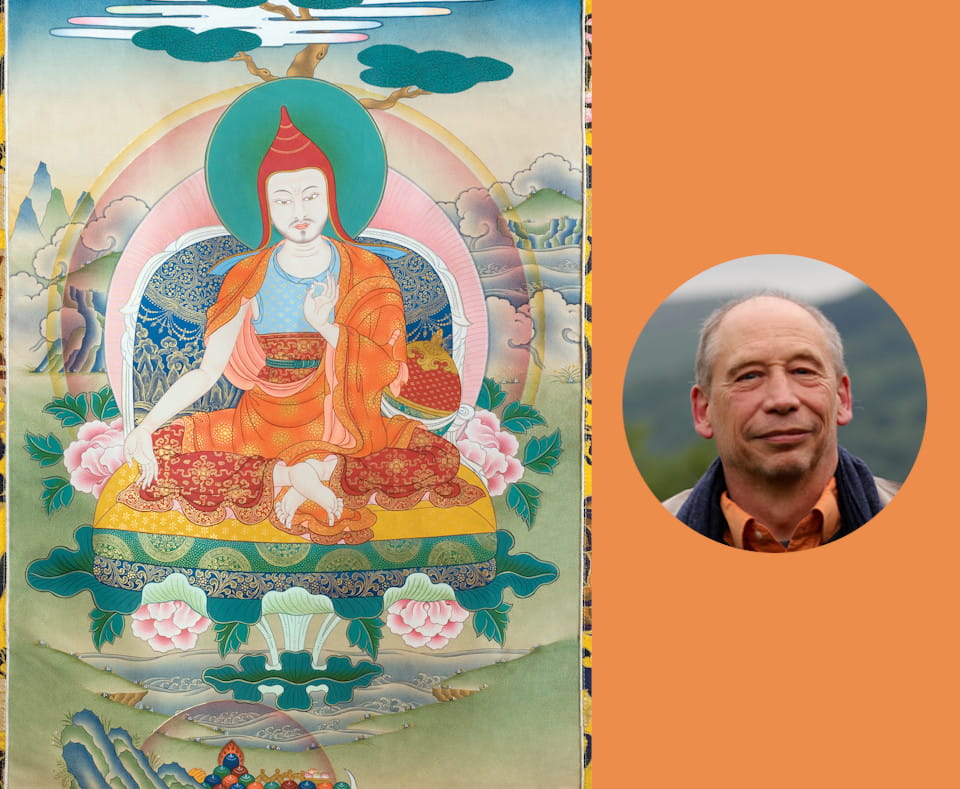From 7 November 2022 - 17 April 2023
+ Organized by Rigpa France +
During this study event, Philippe Cornu - Rigpa Senior Teacher, Writer and Tibetan Translator - teaches one of the key Mahayana texts that clearly presents the ‘Mind Only’ or Yogachara philosophy.
Video on demand
- The live teachings of this course have ended.
- The recordings of all 11 sessions are available on this page in English+French or French-only.
About this course
Vasubandhu is a prominent master and philosopher of Indian Buddhism who lived in the fourth-century. After writing the Abhidharmakosha, he converted to the Mahayana theses of his half-brother Asanga, whose voluminous work he masterfully summarized.
In the Trimsika-karika or Thirty Stanzas, Vasubandhu essentializes in 30 stanzas of 4 lines the entire doctrine of the Yogachara or Chittamatra school, "Mind Only". This second of the two major Mahayana schools exposes the central role of the mind in our perception of ourselves and of the world, how karma conditions us in the illusion that is the source of suffering, and how to free ourselves from it.
By studying this text with the help of its commentary by Sthiramati, we will discover in detail the alienating mechanisms of the mind and its mental factors, and how meditation allows us to free ourselves from them.
Understanding this text is an indispensable prerequisite for the study and practice of Dzogchen or Great Perfection and the Mahamudra of the Tibetan schools, a key to accessing these paths to enlightenment.
Content
- Introduction & background: Vasubandhu and the Yogachara
- First stanzas: beginning, purpose and structure
The structure of Trimsika-karika or Thirty Stanzas text, the mind and its metamorphoses - The consciousnesses
The role of the all-ground consciousness (Skt. âlayavijñâna) and the defiled mental consciousness (Skt. klishtamanas) in the genesis of illusion and belief in a ‘self’. - Consciousnesses and their dynamic relations
This session will present the different types of consciousnesses and their articulation in 8 consciousnesses in the genesis of karma and of our deluded vision of existence. - Mental factors associated with consciousnesses
The Abhidharma teachings and the Thirty Stanzas describe 51 mental factors associated with the different consciousnesses. These allow us to understand the different modalities, modulations and dynamics of the moments of consciousness according to the karmic tendencies and disturbing emotions that dominate our minds. - The three natures
The three natures (Skt. trisvabhâva) allow us to understand how phenomena are perceived in the mind, either in an deluded way or as they are. They can be articulated with the two truths presented by the other Buddhist schools. - Ultimate reality and fruition
The ‘Nothing but perception’ and the overcoming of all duality in tEnlightenment according to the Yogâchâra school. - General conclusion: Yogâchâra and Dzogchen
If Dzogchen willingly uses the presentation in 8 consciousnesses of Yogachâra school, how does it differ from this Mahayana View? How does it go beyond it?
Translations
Philippe Cornu taught in French and was translated live into English.
Study material
Three English translations are available (see here), however the English translator will provide an English text that will be closer to Philippe Cornu’s French translation.
Open contribution
You can contribute whatever is currently appropriate and possible for you. Our recommendations are:
- Suggested contribution: 80 €
- If you want to give more: 100 €
- If you have less means: 64 €
Speaker


